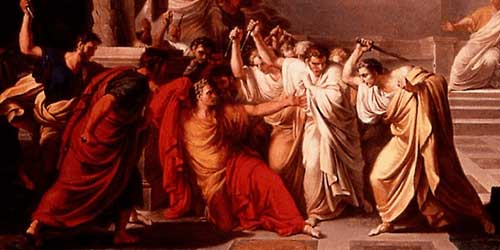|
3/15/2019 1 Comment Beware the Ides of MarchI was fortunate to have Ann Cook Calhoun as my professor of Shakespeare at Vanderbilt University. She brought The Bard to life as no one ever had in my life, or has ever since. I was enamored with her passion for the playwright and she instilled in me a great love for iambic pentameter. She would host a wonderful party for her students at the end of the semester at her home in Belle Meade, down the street from Al Gore’s. We all drank wine and as the evening progressed conducted table readings, well couch readings really, of sections of different plays. We took great liberties in the form such as applying thick backwoods Tennessee accents to roles like Rosencrantz and Guildenstern.
One of the class requirements was to memorize a soliloquy and recite it in her office. I chose the passage from Julius Caesar where Cassius tries to convince Brutus to undertake sacrilege and murder. “The fault, dear Brutus, is not in our stars, but in ourselves, that we are underlings.” So I was familiar with the story of Julius Caesar when I read C.P. Cavafy’s poem “The Ides of March.” Everyone of course remembers the line spoken in warning to Caesar to “Beware the Ides of March.” But less remembered is the letter that Artemidoros implores him to read just before the conspirators stab Caesar to death. The letter that he never read contained a warning about the plot to kill him. Alas, he did not take the time to listen to the message. You can read Cavafy’s short poem “The Ides of March” here. A note on the title. The Romans referred to the middle of each month as the “Ides” – and in the case of March that falls on the 15th of the month – the day that Julius Caesar was assassinated in 44 B.C. The term comes from the Greek idio, meaning equal. So the Ides are the middle of the month when there are an equal number of days before and after. The Ides can be seen as a point of no return: that moment where a plane crossing the ocean must commit to the full journey, because if the pilot goes any further he will not have enough fuel to return to his origin. Or an inflection point of midlife. I read this poem as a warning against the tendency we have to disregard the signals that life sets before us. I had been reading several other modern writers while working my way through the full canon of Cavafy’s work last summer. And so, with the voices of Brene Brown, Ekhardt Tolle and Richard Rohr kicking around in my mind, I plumbed a new understanding of this poem. Rather than walk you through my thinking I’ve composed my own interpretation. This is not an “original” work or a translation. Rather it is an entirely unnecessary selection of words, given that Cavafy conveys the same sentiment in concise and beautiful language. Nonetheless, it helped me understand his message in a new way. I hope it does for you as well. The Warning in the Middle Beware, do not identify with the ego, my spirit Build, as you must, your life structures Those illusory figments that make you think you are the role you play, or important But create them lightly For the more you gain in the world of form, the more careful you must be And when you reach a fullness of material satisfaction When you’ve created an identity for yourself that you want others to admire You’ll have to stay mindful in the arena of this world As you go about with the clever crowd that you’ve cultivated The Universe may try to send you an urgent message Imploring you it is about love and death Stop then Delay your next acquisition Skip the party You’ll see them next time Ignore those pressing distractions Even the job can wait Heed the message -- now Written in response to “The Ides of March” by C.P. Cavafy and influenced by the writings of Eckhart Tolle, Brene Brown and Richard Rohr.
1 Comment
Petro, I love everything about this reflection. First, I think we should resurrect the end-of-semester Shakespeare reading gatherings you describe. I'd be happy to host the first one. Also, your thoughts on the "point of no return" recalled the scene in _Dunkirk_ when the pilot chose to stay in the air above the evacuation area instead of returning to England, and I'm pondering this image now, along with the amazing first lines of Dante's _Commedia_, as I consider the inflection point of midlife for myself. Thanks for this spiritually powerful reflection as I beware the ides of April and hope that the IRS's dagger does not wound too deeply. :)
Reply
Leave a Reply. |
Petro KacurI have a variety of interests and enjoy sharing my reflections on them here. Archives
March 2021
Categories |

 RSS Feed
RSS Feed